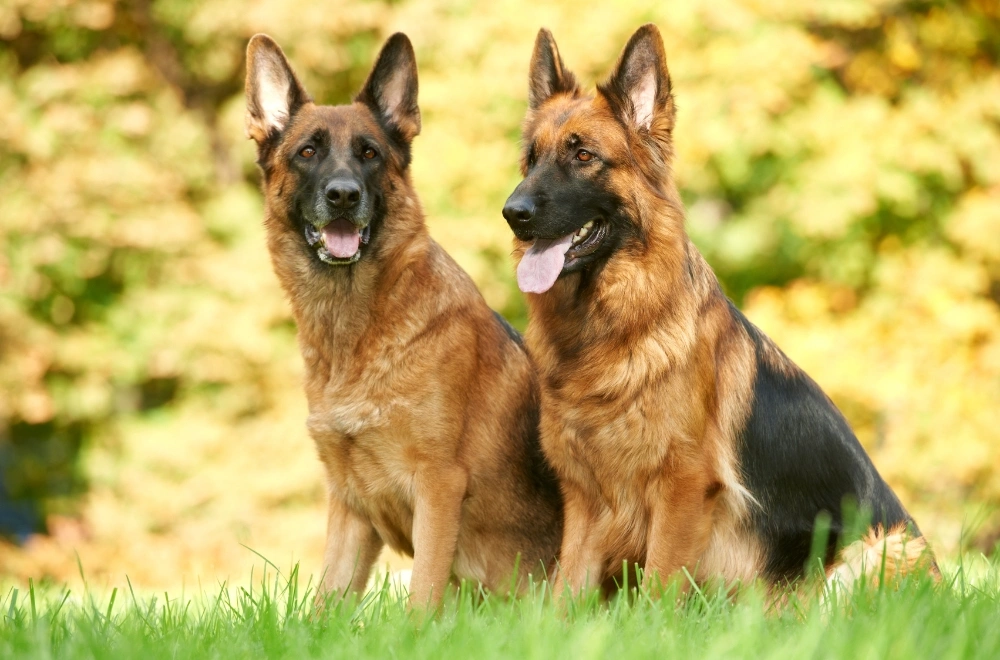Introduction
The German Shepherd (GSD) is one of the most popular and versatile dog breeds in the world. Known for their intelligence, loyalty, and strength, these dogs excel in various roles, including police work, search and rescue, military service, and as loving family pets. This article explores the breed’s history, physical characteristics, temperament, training needs, health concerns, and more.
History of the German Shepherd
The German Shepherd originated in Germany in the late 19th century. Captain Max von Stephanitz is credited with standardizing the breed, aiming to create an intelligent, agile, and hardworking herding dog.
- Origins: Developed from various herding and farm dogs in Germany.
- Breed Standardization: In 1899, von Stephanitz founded the Verein für Deutsche Schäferhunde (Society for the German Shepherd Dog), establishing the breed’s standards.
- World Wars: Gained fame as military and police dogs during WWI and WWII.
- Global Popularity: Became widely recognized in the U.S. and Europe post-WWII.
Physical Characteristics
German Shepherds are large, muscular dogs with a distinctive wolf-like appearance.
Size:
- Males: 24–26 inches tall, 65–90 lbs
- Females: 22–24 inches tall, 50–70 lbs
Coat:
- Double coat (dense undercoat + harsh outer coat)
- Colors: Black & tan, sable, solid black, bi-color
Lifespan: 9–13 years
Temperament & Personality
German Shepherds are known for their:
✔ Loyalty – Deeply devoted to their families.
✔ Intelligence – Ranked as the 3rd smartest dog breed (after Border Collies and Poodles).
✔ Courage – Fearless protectors.
✔ Work Ethic – Thrive on tasks and challenges.
They can be aloof with strangers but are generally good with children if properly socialized.
Training & Exercise Needs
Training
- Highly trainable due to their intelligence.
- Excel in obedience, agility, and protection training.
- Need consistent, firm, and positive reinforcement methods.
Exercise
- High-energy breed requiring 1–2 hours of daily exercise.
- Activities: Running, fetch, hiking, agility training.
- Mental stimulation (puzzle toys, training drills) is essential.
Health Concerns
While generally healthy, German Shepherds are prone to certain conditions:
- Hip & Elbow Dysplasia – Common joint issues due to genetics.
- Degenerative Myelopathy – Progressive spinal disease.
- Bloat (GDV) – Life-threatening stomach condition.
- Allergies & Skin Issues – Sensitive skin.
Preventative Care:
- Regular vet check-ups.
- Proper diet & weight management.
- Joint supplements (glucosamine).
German Shepherds as Working Dogs
German Shepherds are widely used in:
- Police & Military Work – Detection, patrol, K9 units.
- Search & Rescue – Disaster response.
- Service & Therapy Dogs – Assisting people with disabilities.
German Shepherds as Family Pets
- Best suited for active families.
- Require early socialization to prevent over-protectiveness.
- Good with kids if raised together (supervision recommended).
Grooming Needs
- Shedding: Heavy shedders (especially in spring/fall).
- Brushing: 2–3 times weekly (daily during shedding season).
- Bathing: Only when necessary to avoid skin dryness.
Choosing a German Shepherd
- Reputable Breeders: Look for health-tested parents (OFA hip certifications).
- Rescue Organizations: Many GSDs in shelters need homes.
- Puppy vs. Adult: Puppies require extensive training; adults may have established temperaments.
Conclusion
The German Shepherd is a remarkable breed—intelligent, loyal, and highly capable. Whether as a working dog or a family companion, they thrive with proper training, exercise, and care. Potential owners should be prepared for their high energy and grooming needs but will be rewarded with an incredibly devoted and versatile partner.
Would you like additional details on any specific aspect of the breed?
